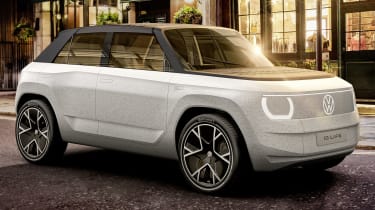Volkswagen ID.1: Polo-sized entry-level EV could start from under £22,000
Volkswagen’s entry-level electric car will arrive in 2025, with concept art suggesting it’ll sport similar styling to the existing ID.3 hatchback

Volkswagen is now targeting a price tag of under €25,000 (less than £22,000 at today's exchange rate) for its entry-level electric car, according to VW's board member for sales, marketing and after-sales, Imelda Labbé. The Polo-sized EV is set to go into production in 2025 alongside a crossover model called the ID.2, plus similar models from both Skoda and Cupra – all of which will use the new ‘Small MEB’ platform.
The Volkswagen ID. Life concept revealed at the 2021 Munich motor show was supposed to be our first taste of the forthcoming ID.1 and ID.2’s design language, but based on a sketch released in May 2022, Volkswagen has changed course and reverted to its established styling approach for electric cars.
Rather than the boxy, retro-inspired lines of the ID. Life (below), the car in the sketch looks more like a smaller version of the existing ID.3. The electric supermini will be the smallest member of the ID. family, which currently includes the ID.3 hatchback, ID.4 SUV, ID.5 coupe-SUV and ID. Buzz minibus and cargo van.
VW has already revealed it plans to launch a total of 10 new electric cars by 2026, including the ID.1, ID.2 and a zero-emissions saloon that'll rival the Tesla Model 3 and Hyundai Ioniq 6, among others. Plus, a compact SUV version of its existing ID.3, which itself is due to receive a facelift in 2023.
Volkswagen has yet to reveal any technical details about the ID.1 or ID.2, but we expect they’ll closely resemble those of Cupra’s UrbanRebel concept which previewed the Spanish brand’s own entry-level EV. The near-production UrbanRebel unveiled in June 2022 used a 231bhp electric motor to drive the front wheels only, with 0-62mph taking 6.9 seconds, while Cupra claimed it could cover up to 273 miles on a charge.
Volkswagen, Skoda and Cupra’s entry-level electric cars will all be built in Spain from 2025, as part of a 10 billion euro investment in the country, which includes a new battery ‘gigafactory’ in Sagunto in the south. This will feed into production of VW Group electric cars at two plants in Martorell and Pamplona.
Speaking to DrivingElectric in 2021, Axel Andorff, SEAT's board member for technical development at the time, suggested that the new car will make full use of the MEB platform's flexibility, but that development will focus on cost saving in an effort to get the technology down to a small-car price point.
“Nobody can do this on their own,” Andorff said. “We’re relying on the experiences that the team already has from MEB. But we also know that just a little improvement of the MEB, on costs and so on, will not be sufficient for what we need for a small battery-electric vehicle.”

